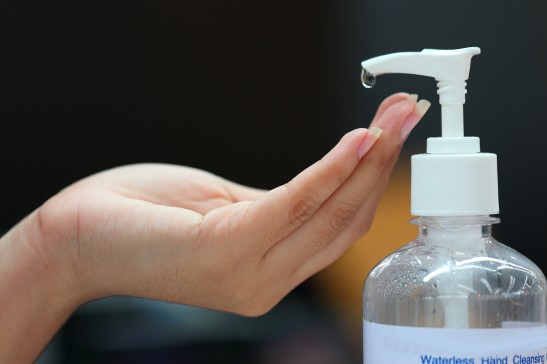Hand sanitizer is a great way to keep your hands clean when you’re out and about. Some people even keep it around the house in different places, such as on the cabinet or table. However, this makes it easily accessible to dogs.
Connect with a verified veterinarian in minutes. Licensed vets are available 24/7 to answer your questions. No need to worry about your furry family member.
Dogs and hand sanitizer really don’t go together very well. Now, if you’ve just cleaned your hands with hand sanitizer and your fur baby licks your hands, there shouldn’t be a problem. The problem comes from a dog ingesting more hand sanitizer than just a lick.
Hand Sanitizer Poisoning in Dogs
Most hand sanitizers are made with ethanal alcohol, which typically has from 60% to 95% ethanol by volume in the product. This is the amount of alcohol needed to kill bacteria and viruses. While this is for our hands, hand sanitizer should never be ingested by us or our dogs.
Ethanol can be toxic for dogs if ingested and can lead to symptoms such as:
- Behavior changes
- Breathing difficulty
- Collapse
- Coma
- Decreased coordination
- Dehydration
- Depression
- Diarrhea
- Heart attack
- Hypothermia
- Lethargy
- Low blood pressure
- Low blood sugar
- Seizures
- Sudden death
- Tremors
- Vomiting
- Weakness
What to Do If Your Dog Ingests Hand Sanitizer
If you suspect your dog has ingested hand sanitizer, then it’s a good idea to call the vet right away. The vet will ask you what type of hand sanitizer your dog has consumed and will need to know the ingredients on the product’s label. The vet will also ask if you know how much your dog has had and let you know if your canine companion needs to come to the clinic or not.
If your dog needs to visit the vet, the vet will perform a physical exam and will order some lab work that may include a blood count, biochemistry profile and a urinalysis. They will most likely also order a blood ethanol concentration test that’s used to measure the amount of alcohol in the dog. These tests help the vet rule out other medical problems and see if there are toxic substances in your dog’s system.
The vet may choose to induce vomiting (never do this at home without the vet’s recommendation), and then afterwards will provide your dog with IV fluids to combat dehydration. Your dog may also require oxygen.
In most cases, dogs that receive prompt treatment have an excellent prognosis of living a long, happy life. However, the key is to get treatment as soon as possible.
And remember to keep hand sanitizers and other chemicals out of the reach of your dog and young kids in your home.
Connect with a verified veterinarian in minutes. Licensed vets are available 24/7 to answer your questions. No need to worry about your furry family member.

Julie
Julie is a graduate of the University of North Carolina, Wilmington, where she studied Animal science. Though contrary to the opinion of her parents she was meant to study pharmacy, but she was in love with animals especially cats. Julie currently works in an animal research institute (NGO) in California and loves spending quality time with her little cat. She has the passion for making research about animals, how they survive, their way of life among others and publishes it. Julie is also happily married with two kids.
Review symptoms, medications & behavior to keep your pets healthy with a Vet Online in just minutes.
Ask a Vet Live Now



